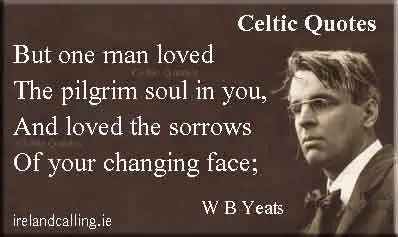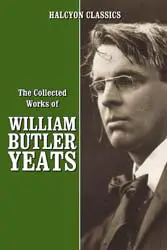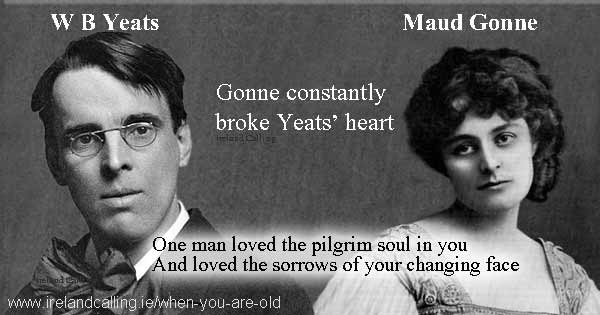W B Yeats spent most of his life besotted with the beautiful actress, Maud Gonne. Sadly for him it was an unrequited love because she did not return his feelings.
She refused his offer of marriage several times, although they remained friends throughout their lives.
When You Are Old
Ireland’s 100 favourite poems
W B Yeats
In When You Are Old he invites her to cast her mind forward to a time when she is old and grey; to a time when she is no longer the glamorous actress but a frail old woman nodding by the fire.
He asks her to take down a book – perhaps a book recounting her life, or perhaps a book containing poems Yeats had written for her. In any case, it is a book designed to help her recall her former glories.
This would be a bitter sweet moment for her. On the one hand she can remember when she was beautiful; on the other, she knows her looks have faded. When she is old she will only be able to dream “of the soft look your eyes had once, and of their shadows deep”.
But one man loved the pilgrim soul in you
When You Are Old was published in The Rose collection in 1893. Yeats was 28 at the time and Gonne was 27.
In the second stanza, Yeats points out that so many men loved her beauty and moments of triumph, but then he gets to his main point:
But one man loved the pilgrim soul in you,
And loved the sorrows of your changing face
He says that unlike other men, he loved her for who she is deep inside; he even loved her as her looks began to fade – “the sorrows of your changing face”. The phrase “pilgrim soul” may refer to Gonne’s independent frame of mind, or perhaps her support for freedom and Irish nationalism.
In any case, it is something unique to her in Yeats’ mind and separate from the more transient qualities of her beauty.
The third stanza seems packed with meaning and power. When they were young, Yeats was a struggling poet while Gonne was successful and famous. While he toiled in the darkness, her star shone brightly; when she is older that light will have faded.
Instead of standing tall among the bright lights, she will “bending down beside the glowing bars”.

By then, her repeated rejections of Yeats may have taken their toll, and she may find herself murmuring “a little sadly, how Love fled”. Love begins with a capital letter here because it refers specifically to Yeats. He is the man who could have been the love of her life, but she rejected him.
Because of this rejection, Love in the form of Yeats, will have left her…
And paced upon the mountains overhead
And hid his face amid a crowd of stars
The change in circumstances is not only that Yeats will have lost patience and stopped trying to make her love him.
Yeats’ departure doesn’t just involve moving away to any old place. He will be pacing on mountains…in other words, while her career has been in decline, his reputation as a poet will be soaring so much that he will be pacing on mountains above her.
Yeats’ When You Are Old is based on a poem by the French poet, Ronsard entitled, Quand vous serez bien vieille.
He will be the one amid the “crowd of stars” whereas Gonne’s star will have faded.
The time sequence of the poem is important because this isn’t really written from the perspective of two old people. It’s written about two young people imagining what life will be like when they are old.
It seems to be an attempt by Yeats to warn Gonne what life could be like if she rejects his pure and genuine love for her and instead turns to what he sees as the less genuine love of others.
If that was Yeats’ intention, it didn’t work as Gonne continued to reject him and went on to marry John McBride – an Irish Nationalist whom Yeats despised.
However, the Yeats-Gonne relationship continued and may have been consummated after she divorced McBride several years later.
Although When You Are Old is specifically about Yeats and Gonne, it works perfectly well if it is interpreted as being about any young couple looking forward to what the future may hold.

When You Are Old
When you are old and grey and full of sleep,
And nodding by the fire, take down this book,
And slowly read, and dream of the soft look
Your eyes had once, and of their shadows deep;
How many loved your moments of glad grace,
And loved your beauty with love false or true,
But one man loved the pilgrim soul in you,
And loved the sorrows of your changing face;
And bending down beside the glowing bars,
Murmur, a little sadly, how Love fled
And paced upon the mountains overhead
And hid his face amid a crowd of stars.

